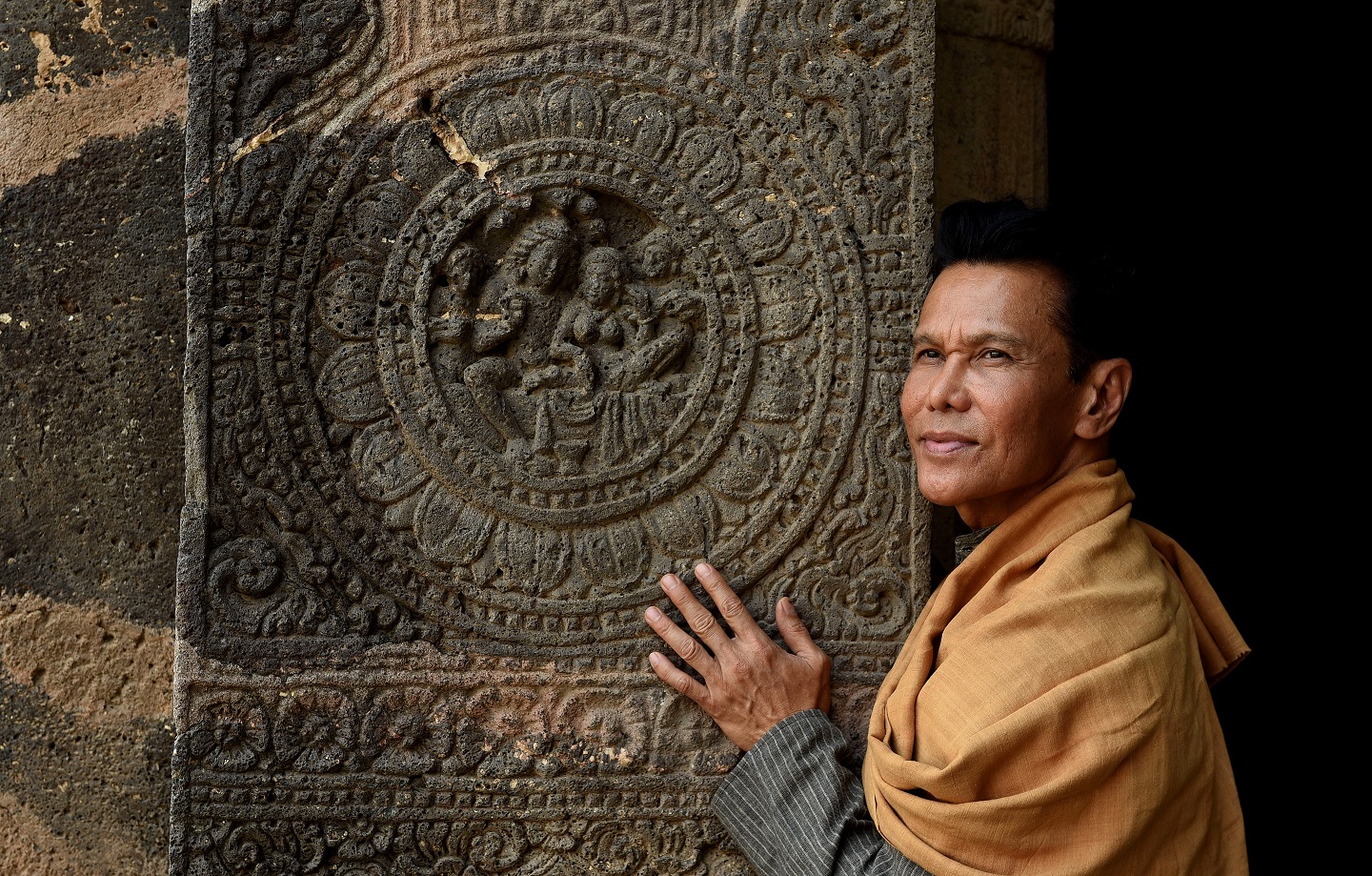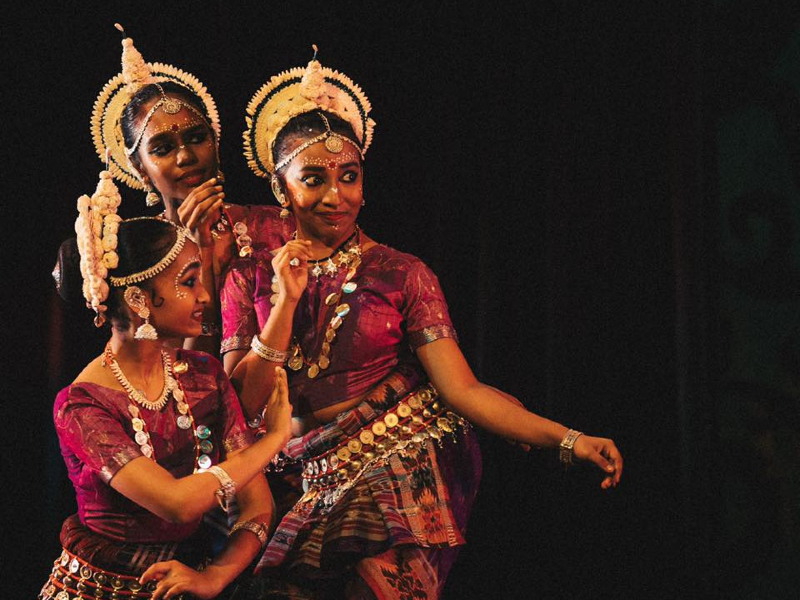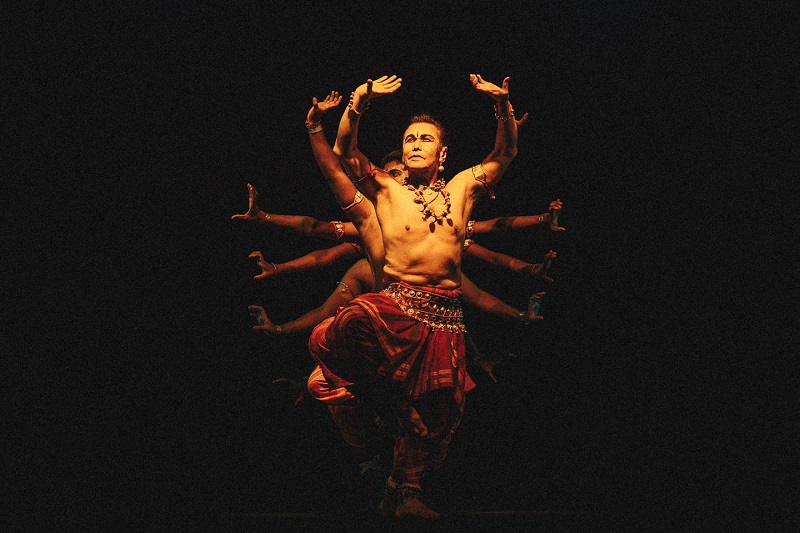
Ramli Ibrahim at the Ajanta Caves in 2018 (Photo: A Prathap)
The celebrated Malaysian dancer and founder of Sutra Dance Theatre talks about being able to perform for a live audience once more after the long pause brought on by the pandemic.
Options: Congratulations on finally getting Triple Frontiers to premiere in Petaling Jaya this week, after Seremban and Melaka. What can the audience expect?
Datuk Ramli Ibrahim: The audience can expect the ‘wow’ factor they have been craving for after a year of lockdown! We, too, have been waiting for this moment of ‘release’, which we can get only with a live audience. This real connection between performer and audience constitutes the ‘X’ factor which makes a theatre experience so special and empowering. The other ‘wow’ factor is that Triple Frontiers will feature 16 young dancers from our Dance Outreach Program. These are the young artistes who have emerged fresh and full of hope as the next generation of Odissi dancers for Sutra [Dance Theatre].
Tell us why you chose to pay homage to three women as the underlying theme in Triple Frontiers?
It must be synchronicity that Sutra’s homage to the three women in Triple Frontiers coincided with the recent International Women’s Day. The three women ‘dance-makers’, Sujata Mishra, Parwati Dutta and Meera Das, are considered the younger generation of Odissi dancer-gurus who are making their presence felt with their works, both in teaching and in choreography. All are accomplished individuals who head their own institutions and are at the creative forefront in their respective communities where Odissi is concerned. Sutra has collaborated with all three and each has presented her own Odissi festival, and they are well regarded by their respective communities.
triple_frontiers.jpg

What was it like performing for a live audience after the long pause due to the pandemic?
Personally, I am rather tired of the online thingy where that immediate relationship with who you speak to or who is watching you, is remote and impersonal. The dance-theatre experience especially thrives on the direct relationship between performer and audience whereas going virtual is as dry as performing comedy to an empty hall. Rasa, in the context of Indian classical dance, is the creative flavour as the result of this direct relationship between the actor and rasika. When this has to go through the filter of a film, it’s a different experience altogether. The actor is no longer in charge … So, performing for a live audience brings back that electric magic that makes a performer tick. It’s moksha, or release from the mundanity of a lockdown!
How do you keep yourself in top form, physically as well as mentally and emotionally?
It was difficult for me to keep myself physically in top form during the MCO (Movement Control Order). I found that I could keep myself mentally and emotionally in balance, but physically I had gained weight. Besides teaching and dancing, I used to swim regularly or walked around the nearby Titiwangsa Park. I was not able to do this during the MCO. As a result, I am now about 3kg heavier and the audience can expect a fatter Ramli on stage. My routine of classes was also disrupted as I had been very physically active when teaching and this activity was significantly reduced. Mentally and emotionally, I had much on my plate to keep me healthy — gardening, painting, reading and cleaning — but my physical routine was disrupted. I also tend to eat more when at home.
sutra_dance_theatre.jpg

What is the talented Sutra team working on next?
We have several projects in the offing after Triple Frontiers. We will be working on presenting a contemporary work for the George Town Festival in July and right after that we will be preparing for our major work Ganjam for a performance at Victoria Theatre in Singapore. Right after Triple Frontiers, I will also be giving several Odissi workshops in Klang, PJ and Ipoh to augment our Dance Outreach Program, with several studio performances in the pipeline for our upcoming young dancers.
How are you stimulating your brain right now?
I am in the middle of reading many books and magazines, from Death, the new book of Sadhguru of Isha Foundation, and My Story: Justice in the Wilderness by Tommy Thomas to Homo Deus by Yuval Noah Harari. I recently attended the launch of Ferri Anugerah Makmur’s book, Cinta Agung Ibu, and Tan Sri VC George’s recent book, Some stories I have told and some that I haven’t. I am also behind in my reading of the regular magazine to which I subscribe — The New Yorker.
And how are you delighting your ears?
I have recently been playing again and again some old keroncong compilations and found them so refreshing. The melody of the keroncong is so soothing. I have also been endlessly playing my archival recordings of composer Colin McPhee and Lou Harrison whose compositions were inspired by Gamelan Bali and Gamelan Jawa respectively. McPhee’s work invokes the feeling of old Bali, which I miss very much, and I remember giving the music of Harrison, inspired by Javanese gamelan, to Malaysian composer Sunetra Fernandez a long time ago to motivate her to do something for our own Gamelan Melayu.
As a Padma Shri, holder of one of India’s greatest civilian awards, to which places in the country would you head the minute international borders open and why?
To Odisha, the birthplace of Odissi, of course! Need you ask?
'Triple Frontiers' will be staged at the PJ Civic Centre from Apr 9 to 11. For more information, call 03 4021 1092.
This article first appeared on Apr 5, 2021 in The Edge Malaysia.


